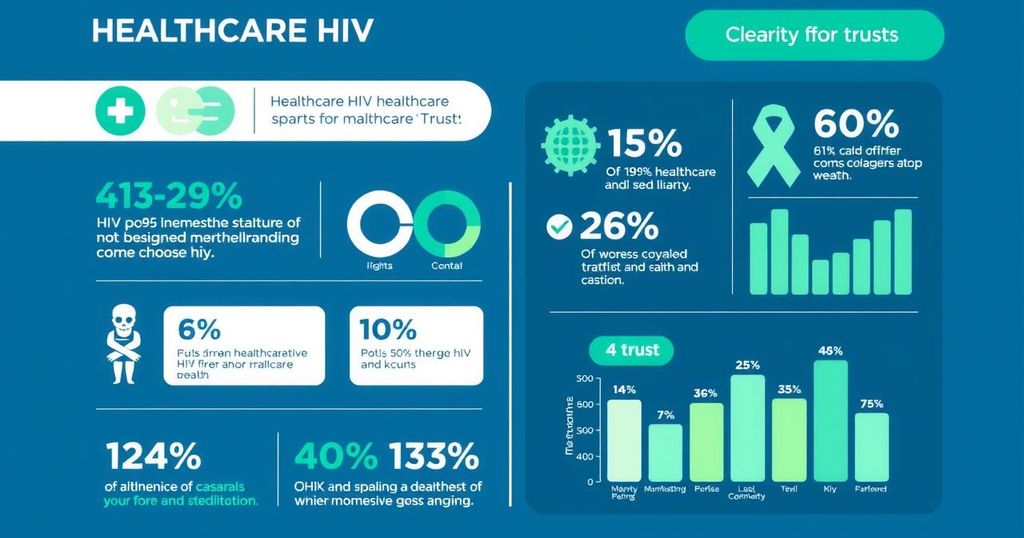Business
economics
AFRICA, APROKO, ASIA, CHINA, CHINONSO EGEMBA, CLINICAL TRIALS, COVID-19 IMPACT, DONALD TRUMP, ECONOMIC DEVELOPMENT, ECONOMY, EUROPE/ASIA, GLOBAL_ISSUES, INDIA, MAHY, MARY MAHY, MEXICO, MOZAMBIQUE, NACA, NATIONAL AGENCY FOR THE CONTROL OF AIDS, NIGERIA, NORTH AMERICA, PEPFAR, RUSSIA, SOUTH AFRICA, UNITED NATIONS - LED HIV / AIDS, US
Jamal Walker
0 Comments
Fact-Checking HIV Claims: An Analysis of Nigeria’s HIV Statistics
Dr. Chinonso Egemba, also known as Aproko Doctor, inaccurately claimed Nigeria has the second-highest number of HIV cases globally, ranking it fourth instead. His assertion of 200,000 new annual infections is outdated; recent data indicate only 75,000 new infections in Nigeria for 2023. The country faces challenges from funding cuts impacting its healthcare system, emphasizing the necessity for better domestic healthcare financing.
A recent assertion by the healthcare influencer, Dr. Chinonso Egemba, known as Aproko Doctor, claimed that Nigeria has the second-highest number of individuals living with HIV globally. However, the facts reveal that Nigeria ranks fourth, following South Africa, India, and Mozambique, with an estimated 2 million infections reported by the United Nations’ HIV/Aids programme in 2023.
The influencer further asserted that annually, 200,000 Nigerians become newly infected with HIV; however, this figure is outdated by a decade. Recent statistics indicate that new infections have significantly decreased, with UNAids estimating only 75,000 new infections in Nigeria for 2023, showcasing a substantial decline compared to earlier years.
Funding cuts resulting from US aid freezes have severely impacted healthcare systems in countries reliant on such support, including Nigeria. The President’s Emergency Plan for AIDS Relief (Pepfar), which has been pivotal in funding HIV treatment in Nigeria, has reportedly been affected by these reductions. Since its establishment in 2003, Pepfar has allocated approximately USD 7.8 billion for HIV care in Nigeria.
Amid these challenges, Aproko Doctor emphasized the need for Nigeria to strengthen its healthcare infrastructure. He, however, circulated potential misinformation; for instance, a report he shared, stating Nigeria had 190,950 new HIV/AIDS infections per year, was based on data from 2015. Public health experts have discredited this outdated information, emphasizing the importance of using updated statistics to assess the country’s response to HIV.
The WHO acknowledges Nigeria’s vulnerability to shortages of HIV medications, prompting the National Agency for the Control of Aids (Naca) to develop local production of HIV drugs and testing kits. Experts underscore the necessity for Nigeria to elevate domestic healthcare funding to enhance its response to the HIV/Aids crisis, recognizing that historical dependence on donor funds poses risks to future programs.
In summary, the landscape of HIV infection in Nigeria has transformed significantly over the years, with new infection rates reducing remarkably. Credible and current data is crucial for informed public health discourse, as misinformation may lead to unnecessary alarm or complacency among the populace.
In conclusion, the claims made by Aproko Doctor regarding Nigeria’s HIV statistics are inaccurate and based on outdated information. Current data indicated a substantial decline in new HIV infections, with Nigeria ranking fourth in the number of people living with HIV globally. The ongoing crisis regarding funding and healthcare infrastructure underscores the need for immediate action to strengthen Nigeria’s domestic healthcare financing and response mechanisms to combat the HIV epidemic effectively.
Original Source: africacheck.org




Post Comment